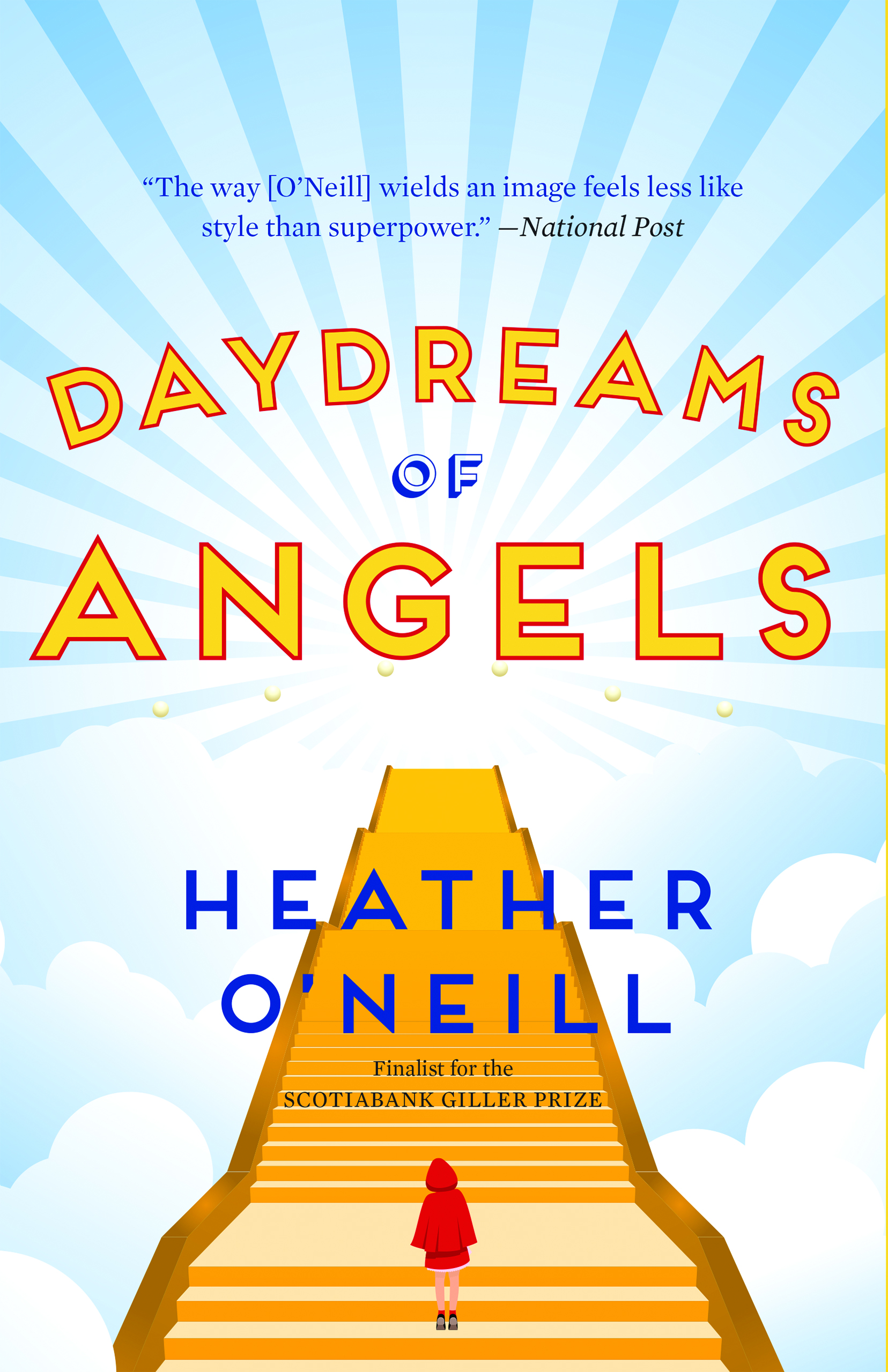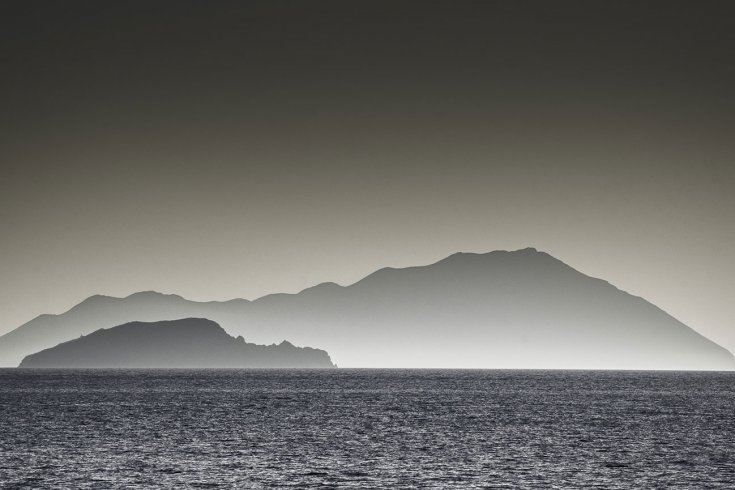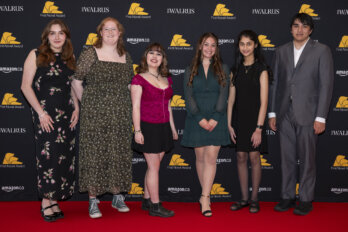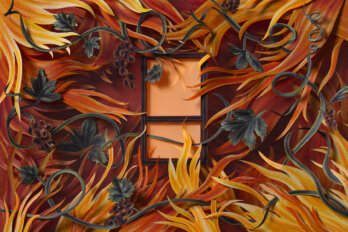Grandfather often enjoyed telling my brother about how, when he was younger, he was a ladies’ man.
“I never had any trouble getting girls,” he’d exclaim. “None whatsoever.”
It was hard for my brother and me to picture it. The grandfather we knew sat on the couch all day, sucking on chocolates with his dentures out and cursing the TV. Who could picture him on a date?
Our mother didn’t like him telling old girlfriend stories, saying that most of them only served to objectify women and feed his own ego, but whenever she’d leave the room, we would beg for one of his tales.
“Tell us about Dr. Moreau!” we yelled one evening when the washing machine had broken down and Mother had gone off to the laundromat. “Tell us about the island of Dr. Moreau!” Grandfather often claimed he’d had a job working for Dr. Moreau and said that the women on the island were unlike any he’d ever seen.
“No . . . I can’t tell you that story,” Grandfather said, playing possum. “Your mother would have my head.”
 HarperCollins Publishers
HarperCollins Publishers“Please!” we yelled. “We won’t tell her you told us.” Grandfather sighed and agreed to tell the story if in exchange we each rubbed one of his feet, at which point he gave in, proclaiming that all stories needed telling eventually and this one was a doozy.
“I was a slim, handsome devil back then,” Grandfather said. “But it wasn’t enough for me to seduce women. I wanted love. True love.”
The story began, he said, one afternoon in 1945. He was out fishing in the Saint-Laurent River when a pompous fool in a white cardigan and sailor’s cap sped by in a motorboat, causing his rickety rowboat to be pitched out to sea.
After two terrible days adrift, a large vessel pulled up and the sailors yelled for him to come aboard. Once he got on, Grandfather saw that the ship was filled with animals. It was like Noah’s Ark! He had never seen so many kinds of animals in his life. The zoo in Montreal didn’t even have a lion. All it had was a geriatric elephant that peed every time it sneezed. The sailors said that they were transporting the animals to the Isle of Dr. Moreau.
It had been years since Grandfather had heard a word about Andre Phillipe Moreau. Moreau had once been considered one of the world’s most eminent scientists. At the age of seventeen, he had famously visited Saint Petersburg to present the Tsar with a mechanical monkey he’d built out of clock parts. The monkey was trained to move its head from side to side when someone was talking, in order to give the vague impression of actually listening. It knew how to diaper a baby.
Of course no sane mother would leave her child with a robotic monkey, so the monkeys were purchased by orphanages, where they were wildly adored by the orphans. There was even footage that circulated of a little boy weeping and telling one of Moreau’s mechanical monkeys about how he had been picked on at school that day. The image of the little boy talking so intimately to a monkey with glass eyes and steel teeth filled the public with so much dread that the monkeys were very soon placed in storage in a Romanian hangar, where they probably remain to this day.
Despite this setback, Dr. Moreau was still considered a young man of unparalleled brilliance, and after claiming in a medical journal that, given enough resources, he could cure male pattern baldness, a pharmaceutical company gave Moreau a massive endowment. He then moved to an island on the Saint-Laurent, where he used the money to commence work on his real project.
Moreau called the small island “the Isle of Noble and Important and Respectable Betterment of Homo sapiens and Their Consorts.” Of course no one could be bothered to say this, so it became simply known as the Isle of Dr. Moreau.
Occasionally, you would hear people speak of Moreau—about a new lawsuit brought against him by the pharmaceutical companies, for instance—but more often than not, as he had not been heard from in decades, he was usually spoken of as an example of wasted potential.
“Some people said his downfall all began after he fell in love with a Russian princess,” Grandfather informed us knowingly. “She was too cold and cultured to love him back and it made him want to turn his back on society.”
When Grandfather first arrived on the island, he was eager to meet Dr. Moreau. The first time he saw him, the doctor was dressed in a three-piece suit and was reading a book of poetry. He smiled at Grandfather and said, “Welcome to this humble little piece of paradise, my child.”
The island was undoubtedly the loveliest place that Grandfather had ever laid eyes on. There were lush flowers everywhere and monkeys and goats running all around. Moreau was in need of extra workers, and so when he was asked, Grandfather readily agreed to stay on.
It was only after weeks of doing menial chores in the laboratory that Grandfather came to understand the nature of Dr. Moreau’s work.
Moreau wanted to create a race of humans who could love more freely—a race who, unlike the Russian princess, would be willing to give their hearts to one another without fear. He believed that somewhere along the line, the evolution of the human species had taken a turn for the worse, and he believed that, by combining the genetic makeup of humans with the right animal, love would no longer need to be a tragic thing, continually questioned and denied until it drove us mad, but it would be something simple, good and pure.
Moreau’s first step, as a means of experimentation, was to begin combining DNA from different animals. The workers Grandfather met were always talking about those first crazy days. They spoke of the ill-fated union of a hippopotamus and a sloth. The giant hippo would try to hang from a bar in its cage and then collapse on the floor and vomit. They spoke of the half-gorilla half-parrot and how it would get all up in your face, repeating what you’d just said over and over. In the workers’ opinion, the worst combination was cows and bats. Eerily they flew through the night sky, dripping milk onto the heads of those below.
After years of mixing animals with animals, Moreau finally felt he was ready to begin his true work: mixing animals with humans.
Grandfather was advised by the other workers not to become too close with these animal people who now populated the island, especially the women; but he was young and searching for love, and the only women who were one hundred percent human anyhow were a couple of older cooks and some washerwomen.
“I had needs!” Grandfather cried.
The creatures were a bit odd in general, since their idea of what it was to act like a human was derived from watching Dr. Moreau, and he was a man who sipped cocktails during surgery and kept his laboratory filled with birds, saying they reminded him to always make sure that his ideas took flight. Moreau spent hours contemplating matters ontological and zoological. He always used big, complicated words and you could only ever understand half of what he was saying. Grandfather said that one time, instead of merely instructing him to open the blinds, Moreau had cried out, “Remove the impediments that curtail my lumination!” Grandfather stood there, shell-shocked, until Moreau pitched a coconut martini at his head and got up to do it himself.
So the half humans, in imitation of the doctor, could often be seen strutting about with walking sticks and saying nonsensical things like “Life is nothing more than a flickering candle. Troubled water that is not even water.”
This is all to say that the island was afloat upon a sea of pseudo-intellectualism.
The creatures had such highfalutin ideas of what it was to be human that when Grandfather showed up, all the girls treated him as if he was a superstar. He had never been so popular in his life.
At first it was disconcerting for him that these women, even if they were very pretty and often looked completely normal, were indeed half animal; but after a while, it just became commonplace to see a vaguely pony-faced girl throw back her head and let out a good-natured whinny, like a happy horse.
His dating life on the island began one day while he was out for a stroll and ran into a half-swan girl.
“But if I had known that swans mate for life, I never would have started with her,” said Grandfather.
He first saw her at a small clapboard theatre that Moreau had ordered built to expose the animals to art. She was on stage, dancing the lead in the ballet Swan Lake. Grandfather thought he had never laid eyes on anyone so gorgeous in his life. She had such long legs and incredibly graceful movements. She was nothing like the girls he’d known back home in the lower-class district where he lived. She was the kind of girl that you could introduce to the Queen even.
Licking his hands and smoothing his hair back, he walked into her changing room and handed her a daisy he’d picked from the shore. As soon as she saw the flower, she became hysterically happy, clapped her hands delightedly and threw her arms around his neck.
Grandfather was amazed at how easy it was to win the swan-girl’s affections. They saw each other every night and couldn’t get enough of each other. She would ask him if he thought her neck was too long—which it was (it made her look like she was perpetually peering over taller people’s heads at a parade), but Grandfather told her he loved her neck. And to confirm this, he would lavish it with kisses, which, because of its great length, was no mean feat.
Although Grandfather found her endearing, there were aspects of her personality that got on his nerves. For instance, she would often point out children on passing bicycles and say that they looked like what their children were going to look like. And after having dated for only a few weeks, she showed up at his door with her suitcase in one hand and her houseplant in the other, declaring that she was moving in.
Grandfather was almost relieved when she met a half-swan man who brought up marriage five minutes into their first encounter. Grandfather realized that she didn’t really love him anyway. She would have had anyone who came along and that wasn’t what he wanted.
“To love everyone is to love no one,” he said. “My ego wouldn’t allow it.”
After that he decided to wait until the right girl came along, and not immediately jump into things. He decided to wait until he met a girl who was less forward, which might account for why he ended up with a girl who was half deer. The deer-girl didn’t have a wicked bone in her body, but she was so shy that when he took her out with his friends, she wouldn’t say a word. She would just sit there looking nervous, whispering that it was time to go soon.
He practically had to move in slow motion around her, and when they kissed, he had to keep his finger on her pulse for fear of giving her a heart attack.
Her panic and lack of social skills didn’t bother Grandfather, but her paranoia did. She complained about everyone looking at her funny—talking about her behind her back. She always thought there was someone out to kill her. She would put locks on her front door, and if someone rang the doorbell she would drop the plate she was holding and scream.
Grandfather knew that loving someone is a risky thing that takes a lot of guts, and the deer-girl just didn’t seem to have the courage it takes.
Here, my brother interjected, agreeing with Grandfather for dumping her.
“I would’ve done the same!” my brother cried.
There was a girl who followed him around the schoolyard but was too nervous to say a word. She always wanted to sit next to him quietly, and it drove my brother crazy. Men.
Several weeks after breaking up with the deer-girl, Grandfather attended an island social dance and it was there that he met a half-lion named Leona. She was so much more laid back compared to the other girls he had dated. She slept about sixteen hours a day, and when she was awake, her favourite activity was lying out in the sun. Grandfather would read her poems while they lay together on the beach.
But of course, Grandfather soon began to discover the darker side of dating a lion. Whenever anyone showed any weakness, she said they should be put out of their misery. His friend Paul, who worked in the lab with him, had asthma, and one day when he was using his inhaler, Leona slapped it out of his hand and told him that a man didn’t need training wheels to breathe. At the time, Grandfather had found the remark rather witty; but several days later, when a blister on his heel forced him to walk with a limp, he found her lack of sympathy hurtful.
“Why don’t you lie down and rest, little baby-man,” she said, licking her back molars, and grandfather limped off as quickly as he could, her cruel laughter echoing behind him.
“Love should make you ten feet tall,” he said. “If only in the eyes of the one who loves you.”
Grandfather had really liked the way the lion-girl had stretched out her whole body when she yawned, and she did have a sexy voice that sort of purred when she talked, and so he decided he could get all of that—minus the threat of violence—from someone who was half-cat. And so he asked out the little cat-girl he saw drinking a milkshake by herself late one night.
She was definitely a cutie, but one day, while searching for a cigarette lighter, he discovered that her coat pocket was filled with dead sparrows. Later she even gave him one as a birthday present, a red ribbon tied around its crooked little neck. She handed him the gift with a look on her face that Grandfather found adorable, even though it was revolting.
Everyone told him not to get mixed up with a nocturnal animal, but he ignored them, and soon he discovered that she could never stay in bed at night, preferring to amble across the way to an island bar called the Sinking Ship, where she would get drunk and make out with the bouncer.
She eventually told Grandfather that she needed someone who was also nocturnal, and Grandfather acquiesced.
“I discovered that small cats can be every inch as hurtful as big cats,” he said, “because when your heart is vulnerable with love, even a fly with a mind to can break it.”
After the cat-girl, the deer-girl and the swan-girl, Grandfather was more than ready to give up on dating altogether. But then one day he met the monkey-girl. On the whole, the island’s monkey-people seemed a ridiculous lot. You’d see them at the bar, ranting and raving at one another and then, a minute later, weeping and declaring their undying love. They were so open with all of their feelings that it almost made you embarrassed.
Still, to their credit, they were more at peace with themselves than the other creatures of the island. They didn’t have an inferiority complex about their animal side like the other creatures. They didn’t seem to want to be human. They didn’t like wearing clean clothes or the idea of having to live in a designated hut—or that when they decided to sleep on the beach, they were told to move along.
“She just loved me,” Grandfather said. “She didn’t care that my socks had holes in them or that I was broke. She laughed at all my stupid jokes and could never stand seeing me sad. It was really beautiful, something I had never had before.” She forgave him for everything. He wrote her a poem filled with spelling mistakes and she didn’t care. He loved how she would look through his hair for nits. He had never imagined how intimate that could feel.
Grandfather told us that he knew pretty much instantly that she was the girl for him. And he realized that he wanted to go back home and start a real life with her in Montreal. Of course the monkey-girl was up for anything, and so she agreed to go.
“But . . . she was, you know, part monkey,” I said.
“I didn’t care,” Grandfather said. “She was so pure. I think we humans have evolved into a stinking, unhappy, disagreeable mess. If there really was a Garden of Eden, then I think Adam and Eve must have been a couple of innocent monkeys madly in love.”
When they arrived in Montreal, Grandfather taught the monkey-girl all about human society, even giving her the human name Margaret.
“Wasn’t that Grandmother’s name? ” asked my brother, slightly alarmed.
“Shush!” yelled Grandfather. “I’m telling a story!” Margaret didn’t even have the natural sense of shame that full-fledged humans have about being naked. Once, on the island, she had come over to his house on a bicycle, wearing only a pair of underwear, a sweater and a pair of rubber boots. He had found it charming, but he also knew this wouldn’t do, and so he showed Margaret how to act like a proper lady. He showed her how to cut her hair into a bob and comb it, how to bathe herself and trim her fingernails, how to put on high-heeled shoes and wear a scratchy wool dress-suit that limited the movement of her legs. He taught her how to type, make omelettes and use a vacuum cleaner.
They had a gay time too, going out to ballrooms and drinking till one in the morning. His mother was a little concerned that Margaret was too much fun, but he knew that she only had eyes for him. Everything made them happy: their little tiny house on Colonial Street, their first rickety car.
“And God rest your Grandmother’s soul,” he said. “She gave me so many good times, that woman.”
“Grandmother—our grandmother—was the monkey-girl? ” my brother exclaimed.
“Our grandmother was so not part monkey,” I asserted. “She barely got off the couch. Remember once the remote control fell off the arm of the couch and she just left the television on all night? ”
“Monkeys get old too, you know. And look at the two of you,” Grandfather said. “Obviously part monkey. Do you think it’s normal to tear around the house all day like lunatics? You can’t sit down in class either. I heard it from one of your teachers. Terrible, really.”
Then my brother started acting like a monkey, jumping from the couch to the chesterfield. And Mother came in and sent us to bed.
“Oh, leave them alone,” Grandfather told her. “They can’t help it. Throw them some bananas, or let them sleep out in the trees. It’s cruel to keep those little animals inside. Send them back to the wild!” he cried as we climbed into bed and prepared ourselves for the jungles of our dreams.





